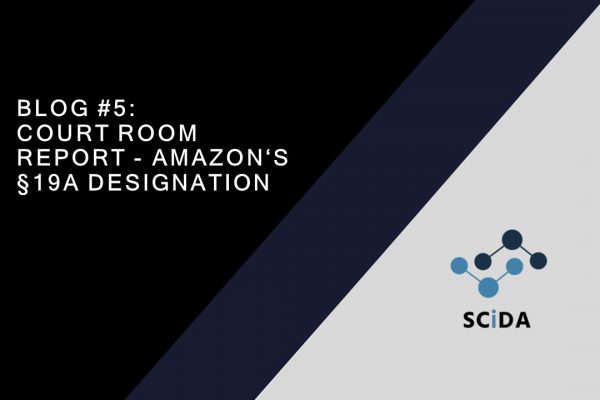The Commission’s DMA team has just given us a peak into their summer plans! However, their summer does not revolve around sunny beaches or city trips, but rather paperwork and workshops. In its latest round of designation decisions, the Commission has announced that Booking will be considered a gatekeeper. As the obligations will only start to apply in 6 months, this news will not impact our summer holidays this year – but how will it change our holidays in 2025?
By Jasper van den Boom

The designation of Booking – a digital giant in the EU travel ecosystem
The Commission announced the latest round of designation decisions on the 13th of May 2024, as a response to notifications by Booking Holdings, X, and ByteDance. Out of the three investigated entities, only Booking has been designated with the gatekeeper status. The Commission has announced it will open a market investigation into X, while ByteDance’s Ad Services remain outside of the scope of the DMA.

The designation of Booking should come as no surprise. Booking’s 2023 revenue came in at around €21 billion, it has over 100 million end-users and lists over 28 million accommodations. Booking is easily identified as the incumbent within its specific segment: travel intermediation. It is clear that Booking exceeds the quantitative criteria set out in Article 3(2) DMA. One may wonder why Booking was not already part of the first round of designation decision. This is largely due to COVID-19 related travel restrictions, which unsurprisingly impacted hotel reservations in 2020 quite severely and led to questions about the entrenchment criterion of Art. 3(2) DMA. However, now that three years have passed and most of us have returned to our regular travel itineraries, we officially have our first Europe originated (yet currently US based) digital gatekeeper under the DMA.
It is hardly deniable that Booking is an important gateway for hotel and accommodation suppliers to reach end-users with a significant impact on the internal market. Booking has become a household name around Europe and is the start and end of many of our ‘investigations’ into affordable and enjoyable hotels. With the passing of time, Booking has increasingly introduced new functionalities to make intermediation between users and hoteliers easier, including package deals and payment options. End users are, however, not the only ones doing their investigations in and on Booking. Booking has faced scrutiny by both the Spanish and Italian Competition authorities. Such investigations are not new. In France and Germany, Booking was already the target of interventions by competition authorities in 2015 for their use of parity clauses. While this would not impact the decision to designate directly, it does give insights into Booking´s central position in the online travel ecosystem (as the Commission has recently dubbed it).
It should then come as no surprise that we consider Booking a gatekeeper in the business of travel, while not everyone may think about Big Tech and digital regulation when they are booking their latest holiday, Booking does sit directly between hoteliers and end users as a digital intermediary. This blog details some of the most important provisions in the DMA in relation to Booking’s services. The focus is on three obligations in particular: the prohibition of parity obligations (Art. 5(3)-(5) DMA), the prohibition of self-preferencing (Art. 6(5) DMA), and data access obligations for business users (Art. 6(9) & (10 DMA).
The long journey to where we are now – Booking’s use of parity clauses in the past
Booking has a long history in competition law related to its use of price parity clauses, and investigations by Member States into those parity clauses. Already in 2015, the Swedish, French and Italian competition authorities accepted commitments by Booking. Around the same time, the German Competition Authority also found the use of such clauses to be unlawful. The history of parity clauses and Booking’s use of them has been chronicled in the recent work by Jens Uwe-Franck & Martin Peitz, where they explore the prohibition of parity clauses in the DMA specifically.
So what is a parity clause exactly? The answer is not as straightforward as it may seem. A clear example of parity is price parity. Under a price parity clause, the business users of a platform may not offer its products or services for a better price through other sales channels. Under a narrow parity clause, the business user is prohibited from offering a better price on their own website. With a wide parity clause, the business user cannot offer a better price through other platforms or sales channels. Parity clauses may not only relate to price however but can also relate to other terms and conditions such as delivery times, aftersales, etcetera. These types of clauses have become more prevalent and relevant with the digitalization of society and the increasing number of digital platforms.
Parity clauses will often summon negative connotations with consumers. After all, these types of clauses prevent the business user or competitors at the platform level from offering us better prices or conditions. Thus, we would get a worse deal if parity clause were involved. There are however some possible benefits to having parity clauses. For instance, absent narrow parity clauses, it may not be attractive to run a comparison website such as Booking at all. If end users only use the platform to find their hotel and can then go to the hotel’s website to get a better deal as nobody has to pay intermediation costs, the existence of platforms like Booking would be short-lived. This thought led the Düsseldorf competition court even to see MFN clauses as “ancillary restraints” for hotel platforms. This move was a bit too bold (and was rejected by the German Federal Court of Justice), but it shows that there is a line of argument pro parity clauses. Wide parity clauses are more widely considered more problematic, and rightly so. The question now is what the scope of the parity clause prohibition should be: will it be limited to wide clauses, or do we include narrow clauses? The safe choice would be to limit the scope of the DMA to wide clauses, but the DMA arguably tends to go beyond limiting itself to the safe choice. Silke Heinz, a lawyer, argues in the DMA Article-by-Article-Commentary that while there are some critical voices regarding the ban on parity clauses, the DMA takes a far-reaching approach towards banning any parity obligations and that asking for any exemption will likely be extremely difficult. With this blanket ban on parity obligations, the Commission moves beyond what is known from competition law, and may push gatekeepers to change their business models to adapt.
These changes to business models may lead to risks of circumvention of the ban, and the Commission may be faced with behaviour that produces similar effects as contractual prohibitions, such as exclusivity clauses, de-ranking, undercutting, and switching to a partially advertisement-based business model. Uwe-Franck & Peitz have looked into these risks of circumvention, and conclude that in the cases of exclusivity clauses and de-ranking we should speak of circumvention, while undercutting (i.e. vertical integration by Booking and offering accommodation at better prices) and the use of advertisements should be assessed through an effects-based approach. This analysis shows that there will be some changes to come: will it start paying to go to the website of the hotel directly, even if we find them on Booking? If we do so, will it mean the end of comparison travel platforms as we know it?
The first is likely, the second is not. In fact, even the use of narrow parity clauses under the DMA may stimulate contestability and the emergence of new comparison services. After all, the DMA only applies to gatekeepers, and entrants may still use parity clauses as to solidify their position and find their minimum price and quality. If they want to stand a real chance, they should offer a better deal to consumers than Booking. Jonathan Baker & Fiona Scott Morton have studied the desirability of banning parity clauses on entry barriers, concluding that such bans are likely to benefit entry and users. Meanwhile, hoteliers are likely to get a better deal as well: as entrants must compete to get hotels and users on their platforms, they become more likely to subsidize both sides of the market as to enter into competition. Like users, hoteliers can start shopping for a best deal of their own. If they can do so without reprisals is discussed in the upcoming section, where we look at self-preferencing.
Before moving on however, it should be noted that the designation of Booking has two more effects on creating a single market for travel. While different national competition authorities have already made their investigations into the use of parity clauses – and even prohibited them – Booking’s designation under the DMA is still highly relevant for two main reasons. First, investigations into parity clauses have been left up to Member States this far, allowing them to intervene against the use of parity clauses, but without any harmonization effects throughout the EU. The DMA applies EU wide, meaning that a single standard is set, at least for the use of parity clauses by gatekeepers. Secondly, the DMA ensures that the prohibition of parity clauses is enacted in a uniform way: there is an EU wide choice to prohibit wide or narrow parity clauses and Booking must implement its compliance strategy throughout the EU. Moreover, the DMA’s anti-circumvention clause also ensures that Booking cannot use means or methods that are similar to parity clauses to impose its will on hoteliers. This fits well with the spirit of freely traveling throughout the European Union, as we can not only freely choose our destination and hotel, but also with more clarity as to which terms and rules apply outside of our respective Member States. At least where gatekeepers are concerned.
The bumpy road forward to new destinations – self-preferencing to replace parity?

Much like parity clauses, self-preferencing may also come in different forms. Self-preferencing entails better treatment of one’s own products and services. Developed in Google Shopping, it referred to placing one’s own comparison-shopping results over those of others. However, self-preferencing behaviour can be more complex. For instance, Amazon has been investigated for giving preferential ranking to third-party sellers if they used more of its proprietary services (logistics, fulfilment). This means that even in an area where the gatekeeper is not directly offering its own products, self-preferencing can take place indirectly.
There may be reason for concern that Booking would engage in similar practices if the parity clauses are prohibited. Specifically, Booking could de-rank hoteliers which offer their services at a better price through their own website or trample on Booking’s nerves in other ways. While they could still be found on the website, they would not pop up as the most relevant result. Alternatively, Booking may start offering package deals on accommodation, transport, and activities. In drafting its terms for eligibility, they may introduce rules that equal parity clauses or self-preferencing for hoteliers. While this may constitute circumvention of parity clauses in some cases, the DMA also prohibits self-preferencing as a behaviour on its own in Art. 6(5) DMA.
The prohibition under Art. 6(5) DMA should go a long way towards resolving problems that arise because of a shift in strategies by Booking. There is however an important exception that falls outside of the scope of the self-preferencing: the introduction of (partially) advertisement-based business models. While the self-preferencing obligation counts towards organic results, there is nothing that prevents the platform from offering a better position or placement through paid advertisements. Again, the Commission should be wary that the terms of eligibility or placement for advertising are not paired with circumvention clauses. However, at a more fundamental level, it seems that with the combined parity clause prohibition and self-preferencing prohibition Booking may be steered towards generating advertising-based revenues if narrow parity clauses are prohibited. If the Commission agrees with Franck & Peitz that exclusivity and de-ranking should be seen as circumvention, Booking’s options to prevent undercutting through the hoteliers’ websites or other channels become limited. Vertical integration is costly, and a long-term strategy. A shift towards an advertisement-based model may be an attractive alternative. The desirability of a shift towards an advertisement-centric model will likely be a significant topic of debate in the coming six months, as Europe’s travel industry has already made clear towards Alphabet that it does not wish to become more intermediated as a result of the DMA, where they’d have to pay more and higher mark-ups for good placement in the search results. Booking will likely stand its ground towards its right to charge mark-ups for placement. Not only will this help it shift its strategy for revenue generation, but it will also help to mitigate the losses of being stuck between a rock and a hard place (neither of which is an enjoyable holiday destination).
Next year’s trip, next year’s booking platform? – Data access and contestability

The prohibition of parity clauses and self-preferencing benefit both hoteliers and competing platforms by ensuring free choice for hoteliers and end-users. The DMA also provides new rights to hoteliers as to better inform themselves on how they can use these newfound freedoms.
Under Art. 6(10) DMA, the gatekeeper must provide the business user, at their request, free of charge, with effective, high-quality, continuous and real-time access to, and use of, aggregated and non-aggregated data, including personal data, generated in the context of providing their services. Access to this data may help hoteliers to understand how end users are being directed to their accommodation on Booking’s website, as well as their conversion, performance and other metrics. This allows hoteliers to determine their advertising and pricing strategies and explore the best routes for direct supply or the use of competing online comparison services. Resolving the information asymmetry may break the hold that Booking has over hoteliers, as they can better understand their own path towards success.
The rights granted to end-users under Art. 6(9) DMA further help the emergence of alternative routes and distribution channels, as competing travel comparison providers can request end-users to share their data to develop more personalized or better curated travel services. This data can be collected not only from Booking, but also other gatekeepers such as Alphabet or Meta, which hold significant amounts of data relevant to desired travel destinations or dream trips. Better access to data allows third-party travel providers to develop and curate packages, while more insights into Booking’s collected data may help them to identify how to compete.
Finally, the obligations laid down in Art. 6(8) DMA may become relevant if Booking indeed shifts towards a more advertising based business model. Under this provision, the gatekeeper would have to provide access to information for their advertisers related to their performance. Thus, in a situation where hoteliers become more reliant on advertising for better placement on Booking’s website, they can also access information to further enhance their advertising strategy and to draw in their visitors. While this will require some adaptiveness from the hoteliers (or third parties that they hire) the rights granted under Art. 6(8) DMA can help to create horizontal effects where hoteliers compete more intensely across different channels including Google’s horizontal search page and a number of online travel portals.
Will next year be the EU travel sector’s ‘hot girl’ summer?
The designation of Booking under the DMA is likely be cause for great celebration in the European travel industry. Hospitality Europe (HOTREC), has stated that “The notification of Booking.com represents an important milestone after over a decade-long struggle of European hoteliers with unfair practices of Booking”. Surely, tourists will not be the only ones to pop a bottle of champagne in the upcoming summer holidays. The actual effects of the designation will arrive at the end of this year, and become visible next year. However, all signs are green and it looks like our plane is lifting off train is departing (in line with the EU’s green goals), towards a less intermediated and more contestable EU travel sector. Let’s hope that the Commission’s hard work this summer also leads to better deals for consumers next summer, so that we can all enjoy that well deserved dream holiday.
P.S. If you don’t have plans for next year, Düsseldorf is great this time of year!





